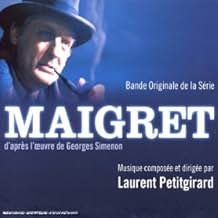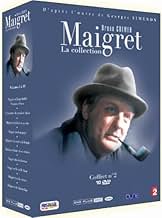Der pragmatische, zurückhaltende und raffinierte Maigret untersucht Morde auf seine einzigartig ruhige Art und Weise und findet unweigerlich die Wahrheit heraus.Der pragmatische, zurückhaltende und raffinierte Maigret untersucht Morde auf seine einzigartig ruhige Art und Weise und findet unweigerlich die Wahrheit heraus.Der pragmatische, zurückhaltende und raffinierte Maigret untersucht Morde auf seine einzigartig ruhige Art und Weise und findet unweigerlich die Wahrheit heraus.
- Auszeichnungen
- 1 wins total
Folgen durchsuchen
Empfohlene Bewertungen
I'm a big fan of Simenon's Maigret. I've read several of the novels and seen all of the movies from Pierre Renoir to Jean Gabin and Charles Laughton. I have seen the very limited Rupert Davies clips on YouTube and I wish there were more to see. Davies looks a lot like Gabin. I didn't care for the Richard Harris Maigret and at first Michael Gambon left me cold but I've changed my opinion somewhat after a second viewing of that series. About a year ago I discovered the episodes featuring Bruno Cremer. I was unfamiliar with Cremer other than seeing him in the excellent Sorcerer film (I think people avoided because of the title). I immediately fell in love with the series. Cremer to me is the Maigret that reminds me the most of the one in the novels. His physical appearance is right (to me). His ability to quietly observe and hone in one the trivial details that almost always are crucial to solving the mysteries. His intuition almost from the start at what or who is behind the crimes and his friction with the judges is the Maigret I recognize. I understand criticism of the slow-moving aspects of the series. But I enjoy watching the patience of this brilliant investigator. The criticism that he's more involved than a man of his rank should be is the exact quality of the author's character and the reason he's disliked by many of his fellow officers and by the judges who think he's too involved. I now have all of the DVD sets in my collection but I continue to watch the episodes in order on MHz Choice that streams on my ROKU players. I'm glad I discovered this great series and if you're a true fan of Simenon and Maigret you would be advised to check it out even if you're not a fan of subtitles. It's worth the effort. In fact, it's worth checking out MHz Choice. I've watched other very entertaining shows on that streaming channel as well from France and other countries.
Love this series. Watching these episodes on Talking pictures tv. We never got the chance to see the French version of Maigret when it was originally made in the 1990s. Bruno Cremer captured the character of the inspector perfectly. Bruno's Maigret can be witty, amusing and grumpy if people irritate him. He is very fond of his food and drink. Sadly we have got to the last episode in the series.i will really miss it.
British tv sadly at present is just about box ticking controlled by the looney left. Watching this series captures just how good a tv series can be.
I'm not familiar with other French tv programs or if they are all up this high standard.
British tv sadly at present is just about box ticking controlled by the looney left. Watching this series captures just how good a tv series can be.
I'm not familiar with other French tv programs or if they are all up this high standard.
The Bruno Cremer "Maigret" series is exceptional and reminds me of those great British books-to-television mystery series from the 80s/90s such as Jeremy Brett's Sherlock Holmes, David Suchet's Hercule Poirot, and (my favorite) John Thaw's Inspector Morse. What I enjoy most about the Cremer series is how well it captures the atmosphere-bars, bistros, apartments, mansions, the wet pavement of the streets, peripheral noises, the varied dialogue, and the quiet moments--that the author George Simenon brings to his books (both his "Maigret" titles and his other novels--I've read all the Maigret stories and several of his other titles). One doesn't read Simenon's Maigret mysteries simply for setup, epiphanous moment, and denouement. I would say the same is true of watching this series. Getting to and finding out "Who did it?" matters, yes, but only a bit. The best parts are the lingering moments in between.
One wise decision made in developing this Maigret series is that all episodes are set in the late 40s through the 50s. Simenon's Maigret novels span across several decades (30s - early 70s) and the change in ages, fashions, cars, and architecture would have been a challenge. And of course, there would have been the war years and the German occupation of Paris. While not actually shot in Paris, who cares? This is the Paris of the late 40s and early 50s, maybe not in reality but the Paris of our-at least, my-imagination, the Paris that Simenon paints in his stories. Capturing that look and feel is crucial if one is to film Simenon. I applaud the filmmakers.
Generally, these episodes adhere to their corresponding novel. Not always and seldom perfectly. I don't mind an addition or embellishment here or there. It's the nature of book-to-film, but if one does it then one better do it well. In this series, it's usually, but not always, done quite well. Bruno Cremer embodies Maigret and delivers, for me, the character I imagined when reading the novels. I'm grateful for the 54 episodes in this series. I wish there were more. (There are over 100 Maigret stories counting both novels and short stories.)
BY THE WAY, In Simenon's Maigret stories, Maigret's assistants change with some being given more prominence than others in different books. Those assistants include Lucas, LaPointe, Torrence, Dufour, and Janvier, among others. The filmmakers sometimes condense these characters into maybe one or two where in the book there are two or three or more. It seldom, if ever, affects the story or plot. While true that Lucas appears more in the novels than in this series he is NOT in every novel as Maigret's right hand man (as one reviewer persists in claiming).
My review here and of individual episodes are based on the DVD set.
One wise decision made in developing this Maigret series is that all episodes are set in the late 40s through the 50s. Simenon's Maigret novels span across several decades (30s - early 70s) and the change in ages, fashions, cars, and architecture would have been a challenge. And of course, there would have been the war years and the German occupation of Paris. While not actually shot in Paris, who cares? This is the Paris of the late 40s and early 50s, maybe not in reality but the Paris of our-at least, my-imagination, the Paris that Simenon paints in his stories. Capturing that look and feel is crucial if one is to film Simenon. I applaud the filmmakers.
Generally, these episodes adhere to their corresponding novel. Not always and seldom perfectly. I don't mind an addition or embellishment here or there. It's the nature of book-to-film, but if one does it then one better do it well. In this series, it's usually, but not always, done quite well. Bruno Cremer embodies Maigret and delivers, for me, the character I imagined when reading the novels. I'm grateful for the 54 episodes in this series. I wish there were more. (There are over 100 Maigret stories counting both novels and short stories.)
BY THE WAY, In Simenon's Maigret stories, Maigret's assistants change with some being given more prominence than others in different books. Those assistants include Lucas, LaPointe, Torrence, Dufour, and Janvier, among others. The filmmakers sometimes condense these characters into maybe one or two where in the book there are two or three or more. It seldom, if ever, affects the story or plot. While true that Lucas appears more in the novels than in this series he is NOT in every novel as Maigret's right hand man (as one reviewer persists in claiming).
My review here and of individual episodes are based on the DVD set.
I have only recently become familiar with Maigret and I am thrilled with the program. Hopefully I can find and watch all of the episodes.
Thank you...
Thank you...
There have been some outstanding portrayals of Maigret, the most recent Rowan Atkinson versions being quite good, but Bruno Cremer best invokes the spirit of books. Maigret is NOT a procedural, although they are certainly mysteries. They are about people and the human condition, best demonstrated by Maigret's compassion. Sometimes for victims, and yes, sometimes even for the criminals. If there is any failing at all in this fine series, it is the relative absence of his wife, who features more strongly in the books and some other versions. One of the most re-watchable series, I had depended on MHZ to view it and finally obtained a DVD set of the entire series. If you love mysteries, you simply can NOT skip over Maigret.
Top-Auswahl
Melde dich zum Bewerten an und greife auf die Watchlist für personalisierte Empfehlungen zu.
- How many seasons does Maigret have?Powered by Alexa
Details
Zu dieser Seite beitragen
Bearbeitung vorschlagen oder fehlenden Inhalt hinzufügen






























